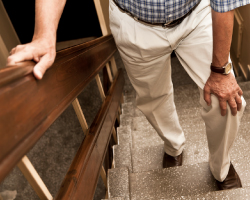
Arthritis is probably best known for the aches and pains it causes. But did you know that the disease can also set you up for a hazardous fall?
A number of things can increase the risk of falling when you have arthritis, according to the Arthritis Foundation. For instance:
- If your joints are stiff and painful, you might use them less often. As a result, the muscles around your joints could become weaker, making you less steady on your feet.
- Joint pain might affect your walking gait. For example, you might take shorter strides. Such changes in your walking could impair your balance.
- If you use opioids to control pain, the drugs may make you dizzy or drowsy. This may cause you to fall. There also seems to be a higher risk of falling among people with arthritis who take antidepressants.
Falling can be serious
A fall can result in injuries like brain trauma and broken bones.
And if you have weak bones to begin with, you are more likely to fracture one of them if you fall. Bones can be weakened by a condition called osteoporosis. People with osteoporosis can break a bone with just a minor bump or fall.
To be clear, osteoporosis and arthritis are not the same things. But your risk for both conditions goes up with age.
And the following arthritis-related factors may further contribute to weak bones:
- Not exercising much due to arthritis joint pain. Regular exercise, such as walking, helps keep bones strong.
- Using corticosteroids to help treat rheumatoid arthritis, an inflammatory form of the disease.
If you're concerned about your osteoporosis risk, talk to your doctor. Depending on your risk factors, you may need to be tested for weak bones. Many women 65 and older are especially at risk for weak bones. But younger women and men can be affected too.
5 ways to avoid a fall
Luckily, there are ways you can reduce your risk of falling. Among them:
1. Talk to your doctor. Find out if any of your medicines, health conditions or lifestyle habits could make you more likely to fall.
2. Keep moving. Exercise can improve leg strength and balance, which may help prevent you from falling. Tai chi is one type of exercise that can help with both of these things. Other activities that are easy on joints include walking, swimming and stretching. Your doctor can suggest safe exercises that may also help relieve your arthritis symptoms.
3. Fall-proof your home. Remove any floor clutter or loose rugs or electrical cords that could cause you to trip and fall. Install grab bars in the shower and by the toilet. Put handrails on both sides of stairways. And make sure your home has good lighting, especially at the top and bottom of stairs.
4. Choose proper shoes. Avoid styles with high heels or soles made from smooth, slippery material, like leather. Rubber-soled shoes are a better choice.
5. Use a cane, if needed. If you're shaky or unstable when you walk, ask your doctor if a cane or a walker would help you.
Reviewed 6/3/2025
Sources
- American College of Rheumatology. "Glucocorticoid-Induced Osteoporosis." https://rheumatology.org/patients/glucocorticoid-induced-osteoporosis.
- Arthritis Foundation. "Osteoarthritis and Falls: How to Reduce Your Risk." https://www.arthritis.org/health-wellness/healthy-living/managing-pain/joint-protection/osteoarthritis-and-falls.
- Centers for Disease Control and Prevention. "Osteoarthritis." https://www.cdc.gov/arthritis/osteoarthritis/index.html.
- Centers for Disease Control and Prevention. "Preventing Falls and Hip Fractures." https://www.cdc.gov/falls/prevention/index.html.
- HealthinAging.org. "Fall Prevention." https://www.healthinaging.org/a-z-topic/fall-prevention.
- National Institute on Aging. "Osteoporosis." https://www.nia.nih.gov/health/osteoporosis.